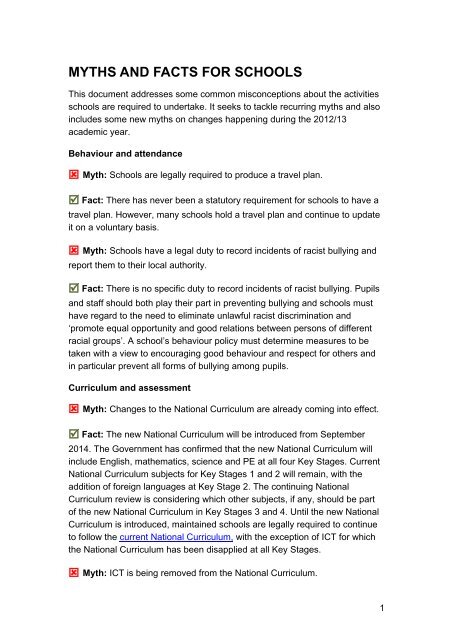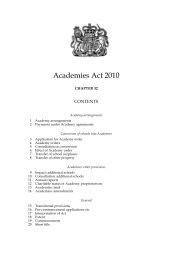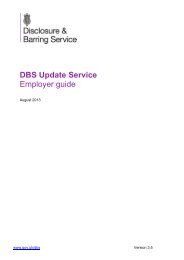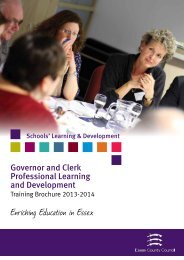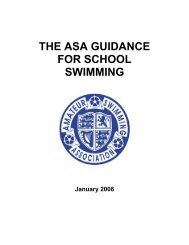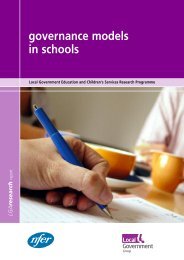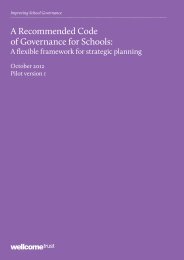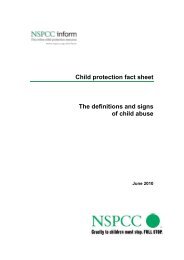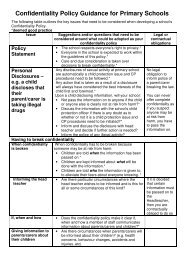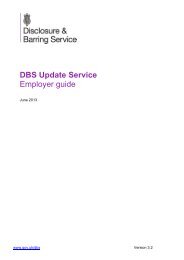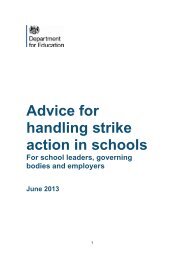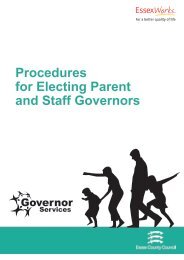Myths and facts for schools DfE updated 1 ... - the Essex Clerks
Myths and facts for schools DfE updated 1 ... - the Essex Clerks
Myths and facts for schools DfE updated 1 ... - the Essex Clerks
You also want an ePaper? Increase the reach of your titles
YUMPU automatically turns print PDFs into web optimized ePapers that Google loves.
MYTHS AND FACTS FOR SCHOOLS<br />
This document addresses some common misconceptions about <strong>the</strong> activities<br />
<strong>schools</strong> are required to undertake. It seeks to tackle recurring myths <strong>and</strong> also<br />
includes some new myths on changes happening during <strong>the</strong> 2012/13<br />
academic year.<br />
Behaviour <strong>and</strong> attendance<br />
Myth: Schools are legally required to produce a travel plan.<br />
Fact: There has never been a statutory requirement <strong>for</strong> <strong>schools</strong> to have a<br />
travel plan. However, many <strong>schools</strong> hold a travel plan <strong>and</strong> continue to update<br />
it on a voluntary basis.<br />
Myth: Schools have a legal duty to record incidents of racist bullying <strong>and</strong><br />
report <strong>the</strong>m to <strong>the</strong>ir local authority.<br />
Fact: There is no specific duty to record incidents of racist bullying. Pupils<br />
<strong>and</strong> staff should both play <strong>the</strong>ir part in preventing bullying <strong>and</strong> <strong>schools</strong> must<br />
have regard to <strong>the</strong> need to eliminate unlawful racist discrimination <strong>and</strong><br />
‘promote equal opportunity <strong>and</strong> good relations between persons of different<br />
racial groups’. A school’s behaviour policy must determine measures to be<br />
taken with a view to encouraging good behaviour <strong>and</strong> respect <strong>for</strong> o<strong>the</strong>rs <strong>and</strong><br />
in particular prevent all <strong>for</strong>ms of bullying among pupils.<br />
Curriculum <strong>and</strong> assessment<br />
Myth: Changes to <strong>the</strong> National Curriculum are already coming into effect.<br />
Fact: The new National Curriculum will be introduced from September<br />
2014. The Government has confirmed that <strong>the</strong> new National Curriculum will<br />
include English, ma<strong>the</strong>matics, science <strong>and</strong> PE at all four Key Stages. Current<br />
National Curriculum subjects <strong>for</strong> Key Stages 1 <strong>and</strong> 2 will remain, with <strong>the</strong><br />
addition of <strong>for</strong>eign languages at Key Stage 2. The continuing National<br />
Curriculum review is considering which o<strong>the</strong>r subjects, if any, should be part<br />
of <strong>the</strong> new National Curriculum in Key Stages 3 <strong>and</strong> 4. Until <strong>the</strong> new National<br />
Curriculum is introduced, maintained <strong>schools</strong> are legally required to continue<br />
to follow <strong>the</strong> current National Curriculum, with <strong>the</strong> exception of ICT <strong>for</strong> which<br />
<strong>the</strong> National Curriculum has been disapplied at all Key Stages.<br />
Myth: ICT is being removed from <strong>the</strong> National Curriculum.<br />
1
Fact: ICT is still a National Curriculum subject <strong>and</strong> maintained <strong>schools</strong> will<br />
still be legally required to teach it. Ministers have confirmed that ICT will<br />
continue to be a National Curriculum subject at all four Key Stages when <strong>the</strong><br />
new National Curriculum comes into <strong>for</strong>ce in September 2014. However, <strong>the</strong><br />
legal requirement on <strong>schools</strong> to adhere to <strong>the</strong> specific National Curriculum<br />
Programmes of Study, Attainment Targets <strong>and</strong> statutory assessment<br />
arrangements has been removed. The existing Programmes of Study <strong>and</strong><br />
Attainment Targets are still available. The difference is that from September<br />
2012 <strong>schools</strong> can choose not to follow <strong>the</strong>m <strong>and</strong> instead teach an ICT<br />
curriculum that is more appropriate <strong>for</strong> <strong>the</strong>ir pupils.<br />
Myth: Work-related learning is compulsory at Key Stage 4.<br />
Fact: The statutory duty on <strong>schools</strong> to provide every pupil at Key Stage 4<br />
with work-related learning was removed from <strong>the</strong> National Curriculum with<br />
effect from 1 September 2012. More in<strong>for</strong>mation can be found on <strong>the</strong> <strong>DfE</strong><br />
website.<br />
Myth: There will be a Key Stage 2 writing test in 2013.<br />
Fact: There will not be an English writing test or English writing sample in<br />
2013. Instead, writing composition will be subject to teacher assessment<br />
(based on work from throughout <strong>the</strong> year), as recommended by <strong>the</strong> recent<br />
Bew review. The more ‘technical’ aspects of English (including grammar,<br />
punctuation <strong>and</strong> spelling) will be assessed by <strong>the</strong> new statutory test of English<br />
grammar, punctuation <strong>and</strong> spelling. This test will be externally marked.<br />
Myth: The Key Stage 2 writing teacher assessment return deadline is not<br />
changing this year.<br />
Fact: As a result of Lord Bew's review, <strong>the</strong> deadline <strong>for</strong> <strong>schools</strong> to submit<br />
teacher assessment <strong>and</strong> P scale data is being moved. Schools will be<br />
required to submit <strong>the</strong>ir teacher assessment be<strong>for</strong>e National Curriculum test<br />
results are returned to <strong>schools</strong>. This change is intended to place greater<br />
emphasis on teacher assessment judgements, which are independent of test<br />
results, <strong>and</strong> to give data earlier to secondary <strong>schools</strong> to assist planning. The<br />
deadline <strong>for</strong> submission of teacher assessment is Friday 28 June 2013.<br />
Myth: Science sample testing at Key Stage 2 is taking place this year.<br />
Fact: There will be no Key Stage 2 science sampling in 2013; a new,<br />
2
iennial, pupil-level sampling system will be introduced in 2014. However,<br />
<strong>schools</strong> are still required to submit science teacher assessments <strong>for</strong> each<br />
pupil. Schools will be provided with full details of science sampling in <strong>the</strong> 2014<br />
Key Stage 2 Assessment <strong>and</strong> Reporting Arrangements which will be<br />
published in <strong>the</strong> autumn.<br />
Exams <strong>and</strong> qualifications<br />
Myth: Schools can only offer qualifications at Key Stage 4 if <strong>the</strong>y have<br />
been approved <strong>for</strong> inclusion in <strong>the</strong> per<strong>for</strong>mance tables.<br />
Fact: Schools can offer any qualifications that have been approved <strong>for</strong><br />
pre-16 delivery. The qualifications approved <strong>for</strong> inclusion in <strong>the</strong> per<strong>for</strong>mance<br />
tables have demonstrated that <strong>the</strong>y are high quality, rigorous <strong>and</strong> provide <strong>the</strong><br />
greatest progression opportunities <strong>for</strong> <strong>the</strong> majority at Key Stage 4. Where it is<br />
in a pupil’s best interest, <strong>schools</strong> can teach qualifications not included on <strong>the</strong><br />
list.<br />
Myth: The Government has banned <strong>the</strong> practice of entering pupils early<br />
<strong>for</strong> GCSE examinations.<br />
Fact: There are no plans to ban this option, as <strong>the</strong> Government<br />
recognises that teachers are best placed to decide when to enter pupils <strong>for</strong><br />
examinations. However, teachers should be sure that early completion of<br />
GCSEs is right <strong>for</strong> individual pupils <strong>and</strong> may find <strong>the</strong> <strong>DfE</strong>’s research on this<br />
helpful. Please also see some Frequently Asked Questions on <strong>the</strong> changes to<br />
GCSEs from 2012.<br />
Health <strong>and</strong> safety<br />
Myth: Risk assessments are necessary <strong>for</strong> every school activity.<br />
Fact: Sensible management of risk does not mean that a separate written<br />
risk assessment is required <strong>for</strong> every activity. Schools do not need to carry out<br />
a risk assessment every time <strong>the</strong>y undertake an activity that <strong>for</strong>ms a regular<br />
part of <strong>the</strong> school day. Risks relating to <strong>the</strong>se routine activities should have<br />
already been considered when agreeing <strong>the</strong> school’s general health <strong>and</strong><br />
safety policy <strong>and</strong> procedures. A regular check to ensure that <strong>the</strong> precautions<br />
remain suitable is all that is required. Higher-risk activities, <strong>for</strong> example waterbased<br />
activities, should be properly planned <strong>and</strong> assessed. Fur<strong>the</strong>r<br />
3
in<strong>for</strong>mation can be found on <strong>the</strong> <strong>DfE</strong> website.<br />
Myth: All accidents involving pupils must be reported to <strong>the</strong> HSE.<br />
Fact: Accidents involving pupils only need to be reported to <strong>the</strong> Health <strong>and</strong><br />
Safety Executive (HSE) where <strong>the</strong> pupil's injury arises out of or in connection<br />
with a particular activity <strong>and</strong> where <strong>the</strong> pupil is taken from <strong>the</strong> scene of <strong>the</strong><br />
accident to hospital. Revised guidance specifically <strong>for</strong> <strong>schools</strong> can be found<br />
on <strong>the</strong> HSE website.<br />
Myth: All portable electrical equipment must be tested by a qualified<br />
electrician at least once a year (Portable Appliance Testing or PAT).<br />
Fact: The only requirement is that electrical equipment needs to be<br />
maintained, if not doing so would lead to danger. The HSE advise that <strong>for</strong><br />
most electrical equipment, visual checks <strong>for</strong> obvious signs of damage <strong>and</strong><br />
perhaps simple tests are sufficient. The HSE website contains fur<strong>the</strong>r<br />
in<strong>for</strong>mation.<br />
Myth: There is a minimum <strong>and</strong> maximum classroom temperature.<br />
Fact: There is no prescribed minimum temperature <strong>for</strong> workplaces<br />
(including <strong>schools</strong>) in health <strong>and</strong> safety legislation, but <strong>the</strong> temperature should<br />
normally be at least 16°C. There is equally no prescribed maximum classroom<br />
temperature. In<strong>for</strong>mation about ventilation <strong>and</strong> <strong>the</strong> avoidance of overheating<br />
<strong>for</strong> <strong>schools</strong> is available on <strong>the</strong> <strong>DfE</strong> website.<br />
Inspection, improvement <strong>and</strong> self-evaluation<br />
Myth: A written lesson plan must be produced <strong>for</strong> every lesson.<br />
Fact: There is no statutory obligation to produce a written lesson plan <strong>for</strong><br />
every lesson. Good planning is, of course, very important but both <strong>the</strong> <strong>DfE</strong><br />
<strong>and</strong> Ofsted are clear that lessons should not be planned in an<br />
overcomplicated or <strong>for</strong>mulaic way. Where <strong>the</strong> quality of teaching is weak, it is<br />
important that <strong>schools</strong> can provide evidence to show that proper planning to<br />
address this is in place.<br />
Myth: Ofsted inspectors expect to see lesson plans <strong>for</strong> all subjects, even<br />
where a school normally only asks <strong>for</strong> written plans <strong>for</strong> particular lessons.<br />
4
Fact: Inspectors will not expect teachers to do anything more than what<br />
<strong>the</strong>y normally do. It is important to stress that lessons should be planned <strong>and</strong><br />
well-structured although it is not necessary to have <strong>the</strong> planning written down<br />
<strong>for</strong> inspectors.<br />
Myth: If an underper<strong>for</strong>ming teacher is asked to produce written lesson<br />
plans, all teachers must produce written lesson plans.<br />
Fact: There is no reason why <strong>the</strong> same lesson planning requirements<br />
should be applied to high <strong>and</strong> under-per<strong>for</strong>ming teachers.<br />
Myth: A school cannot receive an overall effectiveness judgement of<br />
‘outst<strong>and</strong>ing’ if <strong>the</strong> quality of teaching by trainee teachers is not also judged to<br />
be ‘outst<strong>and</strong>ing’.<br />
Fact: This is not correct. Inspectors will take into account <strong>the</strong> full range of<br />
evidence, <strong>the</strong> context of <strong>the</strong> situation <strong>and</strong> <strong>the</strong> impact of teaching on pupils’<br />
learning over time be<strong>for</strong>e determining <strong>the</strong> quality of teaching. Inspectors will<br />
expect to see <strong>schools</strong> playing <strong>the</strong>ir part in developing <strong>the</strong> next generation of<br />
teachers. This is a particularly important aspect <strong>for</strong> good <strong>and</strong> outst<strong>and</strong>ing<br />
<strong>schools</strong>.<br />
Organisation, infrastructure <strong>and</strong> finance<br />
Myth: Academies do not have to comply with <strong>the</strong> School Admissions<br />
Code.<br />
Fact: Like all state funded <strong>schools</strong>, academies must comply with <strong>the</strong><br />
School Admissions Code. The Code applies to academies by virtue of <strong>the</strong>ir<br />
funding agreements.<br />
Myth: The Pupil Premium must only be spent on interventions prescribed<br />
by <strong>the</strong> Department.<br />
Fact: Schools are not instructed on how to spend <strong>the</strong> Pupil Premium.<br />
They are free to decide how to use <strong>the</strong>ir allocation, as <strong>the</strong>y are best placed to<br />
underst<strong>and</strong> <strong>the</strong> needs of <strong>the</strong>ir disadvantaged pupils. Schools are required to<br />
publish in<strong>for</strong>mation online about <strong>the</strong>ir use of <strong>the</strong> Pupil Premium <strong>and</strong> Ofsted<br />
inspectors will consider how well pupils who attract <strong>the</strong> premium are<br />
per<strong>for</strong>ming <strong>and</strong> how <strong>the</strong> Pupil Premium is being used to narrow attainment<br />
gaps between disadvantaged pupils <strong>and</strong> <strong>the</strong>ir peers.<br />
Myth: The governing body is responsible <strong>for</strong> drafting all school policies.<br />
5
Fact: The drafting of school policies can be delegated to any member of<br />
school staff as appropriate. A summary of <strong>the</strong> policies <strong>and</strong> o<strong>the</strong>r documents<br />
that governing bodies are legally required to hold can be found on <strong>the</strong> <strong>DfE</strong>’s<br />
website.<br />
Myth: The governing body is responsible <strong>for</strong> recruiting all school staff.<br />
Fact: The governing body is responsible <strong>for</strong> agreeing <strong>the</strong> number of staff<br />
employed at <strong>the</strong> school <strong>and</strong> must recruit <strong>the</strong> head teacher <strong>and</strong> <strong>the</strong>ir deputies.<br />
The recruitment <strong>and</strong> dismissal of staff below this can be delegated to <strong>the</strong> head<br />
teacher. It is <strong>for</strong> governing bodies to decide if <strong>and</strong> to what extent this should<br />
happen.<br />
Myth: Schools must produce an annual prospectus.<br />
Fact: The School In<strong>for</strong>mation Regulations 2012 removed <strong>the</strong> requirement<br />
<strong>for</strong> <strong>schools</strong> to produce an annual prospectus <strong>and</strong> introduced obligations <strong>for</strong><br />
maintained <strong>schools</strong> to publish certain in<strong>for</strong>mation on a website. New Funding<br />
Agreements will ensure that Academies <strong>and</strong> Free Schools publish <strong>the</strong> same<br />
in<strong>for</strong>mation as maintained <strong>schools</strong>, including <strong>the</strong>ir Pupil Premium allocation,<br />
spend <strong>and</strong> impact on attainment. The <strong>DfE</strong> website provides fur<strong>the</strong>r in<strong>for</strong>mation<br />
on <strong>the</strong> changes<br />
Safeguarding<br />
Myth: Schools must require enhanced CRB checks from all visiting<br />
workers.<br />
Fact: There is no legal requirement on <strong>schools</strong> to require enhanced CRB<br />
checks from all visiting workers. Schools should not check visiting workers<br />
who have already been checked by <strong>the</strong>ir employer or who are escorted whilst<br />
on-site. If visiting workers are going to teach or have unsupervised contact<br />
with pupils, <strong>the</strong> school should ask <strong>the</strong> employer to confirm it has checked<br />
those workers.<br />
Myth: Schools must require an enhanced CRB check on all volunteers<br />
who have contact with children, whe<strong>the</strong>r in a classroom or on a school trip.<br />
Fact: There is no legal requirement <strong>for</strong> <strong>schools</strong> to require enhanced CRB<br />
checks from all volunteers. Guidance on when <strong>schools</strong> should check, or<br />
consider checking, volunteers can be found on <strong>the</strong> <strong>DfE</strong> website. This<br />
6
guidance will be <strong>updated</strong> shortly to reflect wider changes to disclosure <strong>and</strong><br />
barring arrangements.<br />
Myth- The EYFS bans <strong>the</strong> use of mobile phones by parents in school<br />
playgrounds.<br />
Fact- The revised EYFS does not ban <strong>the</strong> use of mobile phones. Early<br />
years providers are required to have a policy on <strong>the</strong> use of mobile phones <strong>and</strong><br />
cameras by staff in <strong>the</strong> setting but this does not apply to parents. The intention<br />
is to ensure that mobile phones are only used when essential <strong>and</strong> staff are not<br />
distracted by <strong>the</strong>m from caring <strong>for</strong> children. If a school’s policy sets out<br />
principles in line with this <strong>and</strong> children are safeguarded <strong>the</strong>n this has met<br />
EYFS requirements. More in<strong>for</strong>mation on <strong>the</strong> EYFS can be found at Link<br />
Schools are able to impose a ban on parents using phones in<br />
school playgrounds but <strong>the</strong>re is no external law requiring, or <strong>DfE</strong> guidance<br />
recommending it.<br />
School trips<br />
Myth: Parental consent is needed <strong>for</strong> all school trips.<br />
Fact: Parental consent is not necessary <strong>for</strong> every off-site educational visit,<br />
only <strong>for</strong> those: involving nursery-age children; taking place out of school<br />
hours; or of a higher risk (<strong>for</strong> example a trip to use a climbing wall). Full<br />
guidance is available on <strong>the</strong> <strong>DfE</strong> website.<br />
Myth: There is a prescribed pupil to staff ratio <strong>for</strong> school trips.<br />
Fact: Pupil to staff ratios <strong>for</strong> school trips are not prescribed in law. Those<br />
planning trips are best placed to decide an appropriate number of adults<br />
taking into account <strong>the</strong> activity to be undertaken <strong>and</strong> <strong>the</strong> age <strong>and</strong> maturity of<br />
<strong>the</strong> pupils. For pupils aged 5 or under you should refer to <strong>the</strong> Early Years <strong>and</strong><br />
Foundation Stage framework.<br />
Myth: School staff must have a D1PCV license to drive a minibus.<br />
Fact: School staff can drive <strong>the</strong> school minibus without any special<br />
licence, as long as <strong>the</strong>ir employer agrees (<strong>the</strong> Local Authority, <strong>the</strong> governing<br />
body or proprietor as necessary) <strong>and</strong> as long as <strong>the</strong> following conditions are<br />
met:<br />
• The staff member obtained <strong>the</strong>ir car driving licence be<strong>for</strong>e 1 January<br />
7
SEN<br />
OR<br />
1997; <strong>the</strong> minibus contains a maximum of 17 seats (including <strong>the</strong><br />
driver’s seat); <strong>and</strong> <strong>the</strong> minibus is not being used <strong>for</strong> hire or reward;<br />
• The staff member obtained <strong>the</strong>ir car driving licence after 1 January<br />
1997 but: has held it <strong>for</strong> at least two years; is aged 21 or over; is not<br />
being paid to drive <strong>the</strong> minibus (save <strong>for</strong> out-of-pocket expenses); <strong>the</strong><br />
minibus weighs no more than 3.5 tonnes; <strong>the</strong> vehicle is used <strong>for</strong> social<br />
purposes; <strong>and</strong> is not being used <strong>for</strong> hire or reward.<br />
Myth: Individual Education Plans are required <strong>for</strong> children with Special<br />
Educational Needs (SEN) but without SEN statements.<br />
Fact: The use of Individual Education Plans (IEPs) <strong>for</strong> children with SEN<br />
but without statements is not a statutory requirement. The 2001 SEN Code of<br />
Practice recommends <strong>the</strong> use of IEPs. The Code is statutory guidance <strong>and</strong><br />
<strong>schools</strong> must take account of it when making provision <strong>for</strong> children with<br />
SEN. However, unless <strong>the</strong> Code is referring to legal duties, <strong>schools</strong> do not<br />
have to follow <strong>the</strong> guidance in <strong>the</strong> Code as long as <strong>the</strong> alternative<br />
arrangements <strong>the</strong>y make are as good if not better than what is recommended.<br />
Staffing <strong>and</strong> work<strong>for</strong>ce<br />
Myth: The post-Threshold, Advance Skills Teachers (AST) <strong>and</strong> Excellent<br />
Teachers (ET) st<strong>and</strong>ards have been abolished.<br />
Fact: They have not. The Independent Review of Teachers’<br />
St<strong>and</strong>ards recommended that <strong>the</strong> st<strong>and</strong>ards <strong>for</strong> Post-Threshold, Excellent <strong>and</strong><br />
Advanced Skills Teachers should be discontinued <strong>and</strong> that a new Master<br />
Teacher St<strong>and</strong>ard should be introduced. No decision has yet been taken <strong>and</strong><br />
<strong>the</strong> current post-threshold, AST <strong>and</strong> ET st<strong>and</strong>ards will continue as <strong>the</strong>y are <strong>for</strong><br />
<strong>the</strong> time being.<br />
Myth: The new Teachers’ St<strong>and</strong>ards apply only in maintained <strong>schools</strong>.<br />
Fact: Academies <strong>and</strong> independent <strong>schools</strong> do not have to assess <strong>the</strong>ir<br />
teachers’ per<strong>for</strong>mance against Part One of <strong>the</strong> Teachers’ St<strong>and</strong>ards (which<br />
deals with teaching) as part of an annual appraisal<br />
process). However, Ofsted inspectors will consider <strong>the</strong> extent to which <strong>the</strong><br />
Teachers' St<strong>and</strong>ards are being met when assessing <strong>the</strong> quality of teaching in<br />
<strong>schools</strong> including academies. Part Two of <strong>the</strong> Teachers’ St<strong>and</strong>ards (which<br />
8
deals with personal <strong>and</strong> professional conduct) apply to teachers in all <strong>schools</strong>.<br />
Academies <strong>and</strong> independent <strong>schools</strong> are required to assess NQTs against<br />
both Parts One <strong>and</strong> Two of <strong>the</strong> St<strong>and</strong>ards during <strong>and</strong> in <strong>the</strong> final assessment<br />
recommendation at <strong>the</strong> end of <strong>the</strong>ir induction period, if <strong>the</strong>y choose to offer<br />
statutory induction to <strong>the</strong>ir NQTs. The new Teachers’ St<strong>and</strong>ards can be found<br />
on <strong>the</strong> <strong>DfE</strong> website.<br />
Myth: All teachers should be assessed against <strong>the</strong> new Teachers’<br />
St<strong>and</strong>ards after 1 September as part of <strong>the</strong>ir appraisal.<br />
Fact: Although new Appraisal Regulations came into <strong>for</strong>ce on 1<br />
September 2012, most teachers’ end of year appraisals in <strong>the</strong> autumn term<br />
are likely to have taken place under <strong>the</strong> previous per<strong>for</strong>mance management<br />
regulations. This is because those regulations continue to apply in relation to<br />
any per<strong>for</strong>mance management cycle already in progress prior to 1 September<br />
2012. Similarly, <strong>for</strong> teachers who apply to be assessed against <strong>the</strong> post-<br />
Threshold st<strong>and</strong>ards between 1 September <strong>and</strong> 31 October 2012 (in Round<br />
12), using evidence from be<strong>for</strong>e 1 September 2012, <strong>the</strong> Core St<strong>and</strong>ards will<br />
still apply.<br />
Fur<strong>the</strong>r in<strong>for</strong>mation on <strong>the</strong> new Teachers’ St<strong>and</strong>ards, including additional<br />
myths <strong>and</strong> <strong>facts</strong>, can be found on <strong>the</strong> <strong>DfE</strong> website.<br />
Myth: Maintained <strong>schools</strong> can keep <strong>the</strong>ir previous per<strong>for</strong>mance<br />
management policies because <strong>the</strong> new appraisal regulations are optional.<br />
Fact: The new appraisal regulations are not optional. They apply to all<br />
maintained <strong>schools</strong>. Schools can retain many aspects of <strong>the</strong>ir previous<br />
arrangements if <strong>the</strong>y wish, but <strong>the</strong>re are three key requirements in <strong>the</strong> new<br />
regulations that were not features of <strong>the</strong> previous ones. These are:<br />
• Teachers must be told of <strong>the</strong> st<strong>and</strong>ards against which <strong>the</strong>ir<br />
per<strong>for</strong>mance will be assessed.<br />
• Teachers’ per<strong>for</strong>mance must be assessed against those st<strong>and</strong>ards.<br />
• Teachers must be given a written report of <strong>the</strong>ir appraisal which<br />
includes <strong>the</strong> assessment against st<strong>and</strong>ards.<br />
Myth: Fur<strong>the</strong>r Education (FE) teachers need to re-qualify in order to teach<br />
in <strong>schools</strong>.<br />
Fact: Since 1 April 2012, professionally-qualified FE teachers can teach in<br />
<strong>schools</strong> without fur<strong>the</strong>r training or assessment.<br />
Myth: Overseas trained teachers need to re-qualify in order to be able to<br />
9
teach in <strong>schools</strong>.<br />
Fact: Since 1 April 2012, suitably qualified teachers from New Zeal<strong>and</strong>,<br />
Canada, Australia, <strong>and</strong> <strong>the</strong> USA can teach in <strong>schools</strong> without fur<strong>the</strong>r training<br />
or assessment. Teachers from <strong>the</strong> EU are also allowed to teach without retraining.<br />
Myth: Initial Teacher Training cannot take place in a Pupil Referral Unit.<br />
Fact: Revised regulations came into <strong>for</strong>ce on 1 September 2012 to allow<br />
initial teacher training (ITT) to take place in Pupil Referral Units (PRUs). This<br />
includes allowing trainee teachers to carry out practical teaching experience<br />
<strong>for</strong> <strong>the</strong> purpose of an ITT course <strong>and</strong> <strong>for</strong> trainees on an employment-based<br />
teacher training scheme to be employed to teach in this setting.<br />
Work experience<br />
Myth: Work experience is difficult to arrange because of safeguarding,<br />
CRB checks <strong>and</strong> health <strong>and</strong> safety legislation.<br />
Fact: Employers do not have to carry out a CRB check on anyone on work<br />
experience. Also, <strong>the</strong> law has recently changed so that employers no longer<br />
need to carry out a CRB check on <strong>the</strong>ir staff who are supervising young<br />
people aged 16 or 17 on work experience. Young people on work experience<br />
are treated <strong>the</strong> same as employees of <strong>the</strong> same age under health <strong>and</strong> safety<br />
legislation. If <strong>the</strong> employer already employs 16 or 17 year olds, <strong>the</strong>y won’t<br />
need to take any fur<strong>the</strong>r action on health <strong>and</strong> safety issues.<br />
10


